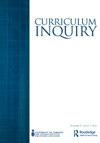We want our children to survive: An interview with Sharon Nelson-Barber
IF 1.6
3区 教育学
Q2 EDUCATION & EDUCATIONAL RESEARCH
引用次数: 1
Abstract
Abstract Sharon Nelson-Barber, a sociolinguist, directs Culture & Language in STEM Education within WestEd’s Science and Engineering content area. She is co-founder of POLARIS—Pacific/Polar Opportunities to Learn, Advance and Research Indigenous Systems—a research and development network that supports healthy communities by integrating Indigenous perspectives with new frontiers of knowledge that strengthen educational transformation. In this interview, we talk to Nelson-Barber about the Indigenous communities she works with and is a part of in the Pacific and Polar regions and the pressing climate change stories that illustrate the seriousness and urgency of adaptation. In the context of climate-induced displacement of Indigenous homelands, Nelson-Barber emphasizes the importance of engaging multiple knowledge systems when thinking and strategizing around climate change education. Thinking within the tension between standardization and localization, Nelson-Barber underscores how careful collaboration with Indigenous elders, Knowledge Keepers, and communities is vital for adaptation knowledge to be passed down within communities and for education systems to be responsive to local contexts.我们希望我们的孩子能活下来:莎朗·尼尔森-巴伯的采访
摘要Sharon Nelson Barber是一位社会语言学家,在WestEd的科学与工程内容领域指导STEM教育中的文化与语言。她是POLARIS(太平洋/极地学习、推进和研究土著系统的机会)的联合创始人,这是一个研发网络,通过将土著观点与加强教育转型的新知识前沿相结合,支持健康社区。在这次采访中,我们与Nelson Barber谈论了她在太平洋和极地地区合作并参与其中的土著社区,以及说明适应的严重性和紧迫性的紧迫气候变化故事。在气候导致土著家园流离失所的背景下,Nelson Barber强调了在围绕气候变化教育进行思考和制定战略时,参与多种知识体系的重要性。在标准化和本地化之间的紧张关系中思考,Nelson Barber强调,与土著长老、知识守护者和社区的谨慎合作对于在社区内传递适应知识和教育系统对当地环境的响应至关重要。
本文章由计算机程序翻译,如有差异,请以英文原文为准。
求助全文
约1分钟内获得全文
求助全文
来源期刊

Curriculum Inquiry
EDUCATION & EDUCATIONAL RESEARCH-
CiteScore
3.10
自引率
17.60%
发文量
37
期刊介绍:
Curriculum Inquiry is dedicated to the study of educational research, development, evaluation, and theory. This leading international journal brings together influential academics and researchers from a variety of disciplines around the world to provide expert commentary and lively debate. Articles explore important ideas, issues, trends, and problems in education, and each issue also includes provocative and critically analytical editorials covering topics such as curriculum development, educational policy, and teacher education.
 求助内容:
求助内容: 应助结果提醒方式:
应助结果提醒方式:


